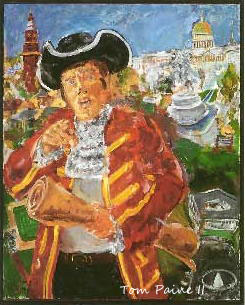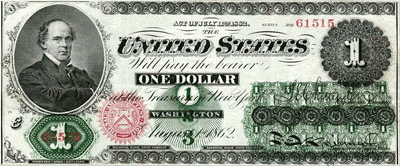(Article changed on May 20, 2013 at 11:31)
(Article changed on May 20, 2013 at 11:26)
1862 Greenback by Public
1862 Greenback by Public
"This is essentially a People's contest ... to lift artificial weights from all shoulders" Abraham Lincoln, war message to Congress, 1861.
SAN FRANCICSCO, May 20, 2013 -- From management workshops to the Oval Office , in major movies and books by the thousands , Abraham Lincoln's leadership is adulated, if not apotheosized. Since a president's leadership mettle is maximally tested by vetoes, Lincoln's vetoes must surely be well-known. Not so. And, Lincoln's most important veto is especially buried and forgotten. Yet, it saved the union, and it still applies today.
The best-selling Lincoln On Leadership does not mention a veto. No veto message appears in Lincoln: Speeches and Writings , a supposedly comprehensive two-volume tome of his "Speeches, Letters, Miscellaneous Writings, Presidential Messages and Proclamations." And, as of today, this is how the people's (wiki's) Abraham Lincoln page tersely summarizes the vetoes of America's most revered president of, by, and for the people:
"Lincoln only vetoed four bills passed by Congress; the only important one was the Wade-Davis Bill with its harsh program of Reconstruction."
The Senate record better informs us that Lincoln issued seven vetoes. His supposedly "only important" veto was a late-session 1864 pocket veto, whereby he let the Wade-Davis bill expire, simply by not signing it. A few months later, this veto was substantially swept aside in the assassination backlash.
Lincoln's June 23, 1862 veto is surely more important. When battles had been lost and soldiers could not be paid, it resolved the Union's financial crisis and was so extraordinary that, in 1869, the Senate Sub-Committee of Ways and Means made a record of the controversy as a matter of "transcendent importance ... for present and future reference." According to the Senate report, Lincoln's alternative measure was "indispensably necessary, and a most powerful instrumentality in saving the government and maintaining the national unity." History Of The Legal Tender Paper Money Issued During The Great Rebellion , page 6.
Lincoln's Message to Congress in favor of a National Currency, but vetoing irredeemable bank notes is on page 36. An irredeemable or "fiat" note is paper money that is declared legal tender by statute but is not backed by intrinsically valuable commodities such as gold or silver. Lincoln vetoed a bill to permit circulating issues of fiat bank notes, materially equivalent to today's Federal Reserve bank notes, [1] on the ground that it made much more sense to instead issue fiat United States notes. Today, the privately owned Federal Reserve System pays the Treasury only the cost of printing the bank notes that it then issues to the public at no less than full face value. [2] At present, no true United States notes are issued.
Lincoln's message to Congress, explaining the obvious advantages of government-issued fiat United States notes over borrowing fiat bank notes, is as follows:
"The object of the bill submitted to me, namely, that of providing a small note currency during the present suspension [of redeemable bank notes], can be fully accomplished by authorizing the issue, as part of any new emission of United States notes... Such an issue would answer all the beneficial purposes of the bill, would save a considerable amount to the Treasury in interest, would greatly facilitate payments to soldiers and other creditors of small sums, and would furnish to the people a currency as safe as their own Government."
On July 11, 1862, an undivided Congress concurred and issued the famous one dollar greenback. In December 1862, Lincoln reported to Congress that the measure had saved "the people immense sums in discounts and exchanges."
Thus, by his veto, Lincoln's leadership was indispensably necessary in issuing the nation's first currency, as fiat greenback dollars. Lincoln's commonsense veto message defied and trumped bank brinksmanship, propaganda and lobbying, saving the people from the imposition of an artificial burden of compounding debt to bankers who then (as now) offered no more than paper money, which the government itself could as easily and far more efficiently issue. [3]
Why in 2013 should we the people now bear that artificial and compounding debt burden? It is a far more absurd imposition today, for now, and not then: (1) we already print the fiat notes that the banks issue; (2) by legal tender acts, we already provide the full faith and credit without which the bank notes would be valueless; and (3) we have already accrued a long-compounded debt of such a crushing magnitude that interest payments consume our taxes, while bankers chastise us for living beyond our means. Meanwhile, President Obama applauds the economic marvel Lincoln's leadership wrought, as in his "Jobs Act" message to Congress on September 8, 2011:
"[I]n the middle of a civil war, [Lincoln] was also a leader who looked to the future, a Republican president who mobilized government to build the Transcontinental Railroad, launch the National Academy of Sciences, set up the first land grant colleges."
All this manifests the importance of renewed debate reissues of debt-dissolving, interest-free, pay-as-you-go fiat United States notes, versus continuing the gift to private banks of an absolute monopoly over the Treasury's money-printing presses.
(Note: You can view every article as one long page if you sign up as an Advocate Member, or higher).






